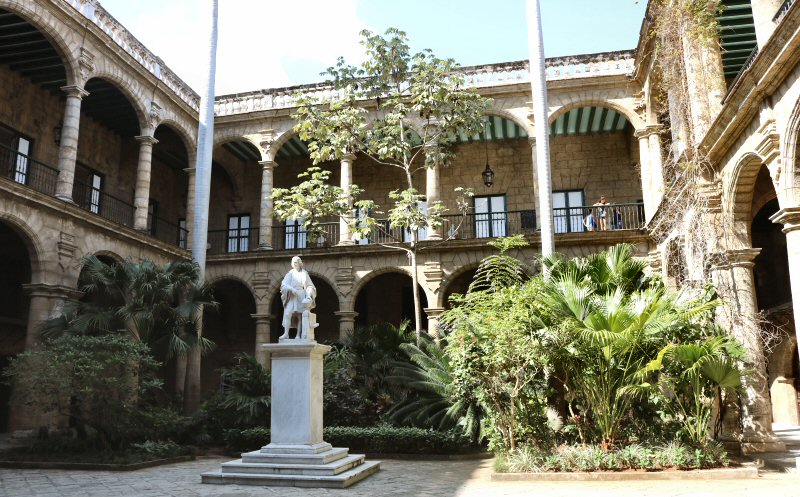
The Palacio de los Capitanes Generales is a
thick-walled building in the Cuban baroque style that is in great harmony with
the trees of the adjacent park in creating an urban landscape. Despite all the
different ways of its use, the building is not so much altered from the time of its original
construction.
ARCHITECTURAL FEATURES
The building has a quadrilateral shape, occupying the
complete block. It has a height of 22 meters. The front of the building has an
arcade supported by ten thick columns that in turn form nine equal arches,
featuring a deep loggia. The pavement is made of china pelona (smoothed stone
that can be boosted by the force of water). Above the arcade, the first floor has
a façade, built by the local limestone that was brought from the nearby
quarries of San Lázaro. The surface is rough and has many hollows due to the
conchifera, embedded into the limestone that gives a rustic appearance to the
stone, raw and natural. At some points the walls had been peeled and covered
with fine finish, but their original status had been recovered in 1930.
Stained-glass windows are fronted by balconies with iron fence on the facade of
the first floor.
The main entrance is covered with Carrera marble. The
marble shield of the Spanish Crown, encircled by the neck chain of the Knight of
the Order of the Golden Fleece, is placed at the top of the entrance. Crossing
the great wooden gate of the main entrance, the visitor receives the cool air of
the beautiful central patio. The open courtyard that was the commonplace of the
residents of the time, is overlooked by a gallery on all four sides. It was
customary to give recitals and receptions in this spacious courtyard; today
peacocks walk with a swing.
In the center of the patio stands the white Carrera
marble statue of Christopher Columbus that was brought from Italy and erected
here on a pedestal in 1862. It is the work of the Italian sculptor J. Cucchiari.
The statue is escorted by royal palms and leafy yagrumo trees.
At the right side of the patio a plaque is hung on the
wall to commemorate the death of Doña Maria Cepero that was shot down by the
fire of an arquebus while she was praying in the Parroquial Mayor in 1557. In
her memoriam, a tombstone was erected in the shape of a niche that had a cross
in high relief. On the lower part it had an inscription in Latin on the lower
part: “Doña Maria Cepero casually died in 1557. Our Father, Ave Maria”. When the
parish church was demolished, it was embedded into the wall of the courtyard of
the Palacio de los Capitanes Generales. It is the first funerary monument of
Cuba.
The tomb in the crypt to the left holds the remains of
several graves, discovered in the cemetery of the old parish church.
